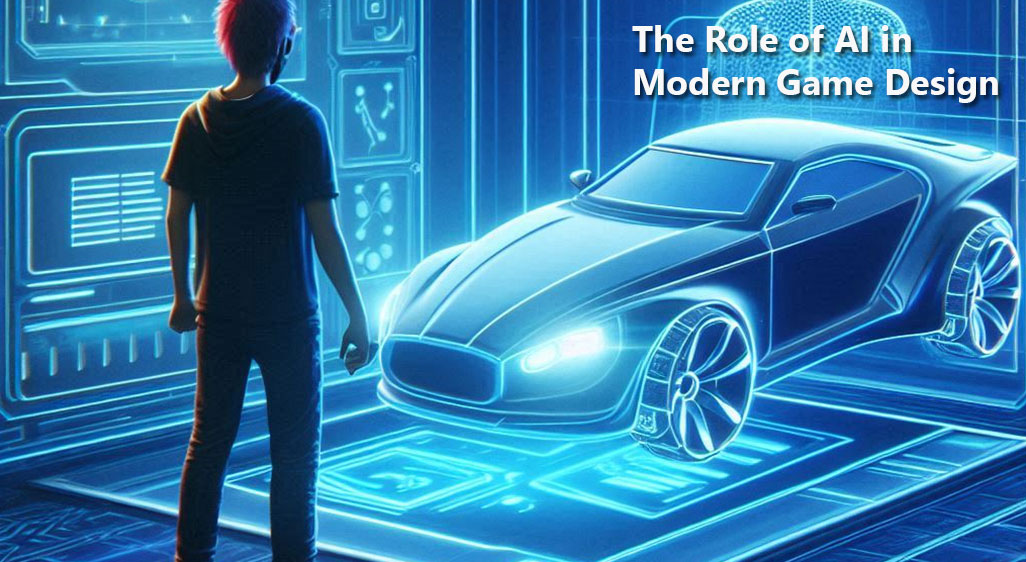
The Role of AI in Modern Game Design
Artificial Intelligence (AI) is a branch of computer science that deals with the development of smart machines that match the human mind with their ability to gain knowledge, solve problems and make decisions like humans. In game development, AI has an increasing role in making games that are more absorbing, responsive and smarter. Using AI techniques and algorithms, game designers can create dynamic non-player characters (NPCs), realistic settings and game challenges that vary according to the player’s expertise. The advent of AI has made gaming more personal and fun by completely revolutionizing the way games are made.
Enhancing Game Worlds with AI
A thrilling aspect of AI’s impact on game design is the production of more lifelike and changeable surroundings. The whole universe of games may be created by algorithms, from extensive landscapes to complex cityscapes that seem as though they are alive and responsive to player feedback. This is done through the use of procedural generation, which utilizes AI algorithms to generate endless numbers of different game levels. Instead of relying on designed levels, procedural generation ensures that each experience is unique and unpredictable by providing an almost infinite number of gameplay possibilities.
However, AI’s reach into game worlds exceeds mere surroundings. Furthermore, there are artificial intelligence (AI) non-player characters (NPCs), which make the game more real and responsive. This means they respond to in-game actions or events. Such intelligent choices are achievable through improved artificial intelligence. What results is a believable and rich world with people that seem to think rather than just robots, which players move around in. Game developers may take advantage of AI by designing games that engage users within an environment.
Adaptive Game Difficulty with AI
Another way AI is revolutionizing game design is through the ability to dynamically adjust game difficulty to match the player’s skill level. Gone are the days of static difficulty settings that either make a game too easy or too challenging. AI-powered adaptive difficulty systems can now monitor a player’s performance and make real-time adjustments to ensure an optimal level of challenge.
This is possible through AI-driven adversaries and hurdles that can understand a player’s moves and change their plans as needed. For instance, if the player keeps outwitting one specific enemy constantly, that enemy may alter its manner of engagement into something unpredictable or even use a different approach to engage the player. On the other hand, if the player is struggling with a particular challenge, then AI can make it less difficult to avoid frustration and ensure enjoyable experiences. By leveraging adaptive AI, game designers are capable of developing games that are both challenging and enjoyable for players at different skill levels. This way, they do not become too easy or excessively difficult, thus becoming dull to play but they remain interesting and amusing.
Intelligent Game Agents
One of the most intriguing frontiers in AI-driven game design is the development of intelligent game agents that can make decisions, learn, and adapt like human beings. By employing advanced forms of intelligence in their designs, developers can create non-player characters (NPCs) that have intricate and credible behavioural patterns which go beyond the simplistic scripts and routines from before.
These intelligent game agents are capable of scrutinizing the environment around them, generating many possible courses to take and then deciding their goals and priorities. They can draw lessons from what they have experienced to modify their strategies, making it difficult for gamers to predict how these characters will behave during interaction with them. This allows creators to shape more immersive narratives because NPCs will be portrayed as active agents who possess their motivation.
Furthermore, intelligent game agents can exhibit emergent gameplay, where they act independently in response to unexpected circumstances as they unfold in real-time. Consequently, gamers might find themselves confronted by unplanned events while exploring virtual worlds which are inhabited by self-aware characters, resulting in unscripted or spontaneous encounters between players.
The Future of AI in Games
AI’s rapid development and extraordinary potential in game design make it more exciting than ever. We are also expecting AI to produce more advanced games that will be so realistic and immersive that they push the limits of interactive entertainment.
That’s why we wonder about a future in which computers create everything from nothing but algorithms: entire game-worlds, stories, and mechanics. Though still in its infancy, the technology could allow for endless gameplay situations where every new release would feel different and personal to the player.
The AI is likely to go beyond designing whole games and engage in some aspects of direct game creation, like helping human developers optimize levels, characters, or systems for better player experience and fun. With artificial intelligence’s help, that can think analytically and make prompt decisions, however intelligent it might be, designers of video games can be more productive throughout their projects, focusing on creativity, thereby simplifying their workloads.
Undoubtedly, incorporating AI into game design will lead to an increased need for clear ethical considerations. Issues relating to transparency, bias, and the autonomy of AI-driven game elements will require careful exploration to maintain players’ feeling that the designer’s ideas are equitable, fun, and in tune with the truth. Nevertheless, with a proper strategy, AI’s role in video games emerges as the most promising and revitalizing one.
To Conclude…
AI technology is being dated in the games industry, and it’s clear-cut that it will be the main mechanism that empowers the creation of future immersive, flexible, and smart gaming experiences. The application of AI can lead to the creation of more interactive and playable game worlds, which will include a wide variety of vivid characters who operate according to their specific tasks or objectives.
As we look into the future, the development of AI games will be a circuit between the computer and the human system, where the computer will streamline the work and help designers focus on their ideas. Moreover, the AI technology integration will be the main source of significance and will demand a lot of ethical concerns, which must be very carefully approached to make sure that the games are still fair, sincere, and in line with the concept of the designer.
These are indeed exciting times for the gaming industry, as the continued advancement of AI promises to transform the very nature of interactive entertainment. For those interested in pursuing a career in game design, now is the perfect opportunity to explore the best courses offered at institutions like Arena Animation and Park Street, where you can gain the skills and knowledge needed to thrive in this rapidly evolving field.












